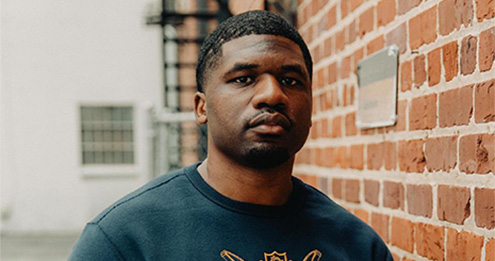- Veteran
- Project Management
- Marines
- Training
- Mentorship
Certification Spotlight
Credentialing success from the Service community
Army Sergeant’s cybersecurity passion fuels career growth for himself and others
Staff Sergeant Leonard Lewis believes certifications and digital badging allow him to showcase his cybersecurity passion, proficiency, and professionalism to both military colleagues and civilian collaborators.
Leonard Lewis used certification to convert his childhood interest in computers to a military cybersecurity career. Now as a Network Administrator working with NATO, he has helped dozens of others do the same.

Leonard Lewis, Staff Sergeant, United States Army
What certifications do you have and what made you want to get certified?
I’ve always liked learning about computers and seeing how things function. When I got to my last duty station, cybersecurity was listed as a choice. At first, I worked with nearly all civilians, and they were very experienced with cybersecurity and taught me the basics. Being in that position and just having the opportunity to learn so much made me want to continue to move forward in cybersecurity. In the military we use a career tracker, and for my job there are certain education and certification goals that I can look at and see where I need to be. That helped me want to continue to get certifications because it highlighted how certifications help with the career progression both as a military member and as a civilian. My most recent certification is the CompTIA Advanced Security Practitioner (CASP). I also have the Cybersecurity Analyst (2019) which is the one under CASP. I have the CompTIA PenTest+ (2022), I have CCNA (2020), and I have Security+ (2017) as well.
IT is my career and I really want to be able to take pride in my career, challenge myself, and get certifications that show employers as well as myself that I can learn and retain the knowledge, and apply it to situations that I come across, whether that is at work or at home.
Can you speak to the benefits of certification as a component of force readiness and professionalization within the DoD and how it has impacted your career?
One big thing is that there is not a single point of failure. The Army is providing credentialing assistance and prioritizing certification alongside other educational opportunities and job elements, because they make you an all-around better Soldier. Some people do get into this field because they don’t want to do the low-level military stuff, and for those people it might be just a “check” on a line, but people recognize when someone genuinely loves the IT field. Certifications show growth and curiosity.
My last duty station was at Fort Eisenhower, where the Cyber Center of Excellence is located. I worked with all civilians there, so having these certifications was an immediate value that I brought to the unit. When it came to something technical, I would help the two sides understand the different terminology. I was a buffer between the military and civilian professionals because I had cybersecurity certifications.
When I first came into the career, I was lucky to have people who spread the knowledge and showed me how to do things, and now I’ve helped at least thirty people go through the certification process myself…Once you find your community of like-minded thinkers and share the different experiences, everything becomes a lot easier.
Have you found that promoting your certifications via Credly has been beneficial and valuable for your career growth?
I use Credly a lot to show people the skills that I have and the certifications that I have received.
I am always telling people to sign up for Credly and get their badge, because it’s easy for anyone to click on your badge and verify that you have a certification. You can also add it to your signature block – there are so many different ways that you can use Credly. I love it. I’m a big advocate for it. I’ve been using it since it was Acclaim.
What is your test preparation process?
It’s about taking pride in learning the information. I give myself six to eight weeks to take the exam. The first week I’m just going through the content to see what I know. I like the Pearson VUE test prep content because you can immediately see and track what you know. I know that if I get 80 percent on a section, then I don’t really have to focus on that too much and I can focus on where I am weaker.
Then the next two weeks are solid studying and reading, making sure that I put enough time into studying based on how much time I have before the exam date. A week before the exam I am looking at exam videos and confirming that I know all the content and that my studying worked. The night before the exam I put the study tools down and give myself time to get into the proper headspace.
Have you gotten any feedback from people you helped guide through the certification process?
I was raised to share knowledge and help people, and I’m a big believer in helping people in the way that they like to learn things. When I first came into the career, I was lucky to have people who spread the knowledge and showed me how to do things, and now I’ve helped at least thirty people go through the certification process myself. I saw a guy who was celebrating a passed certification exam and showing his colleague how to start the process in the same way that I showed him. Once you find your community of like-minded thinkers and share the different experiences, everything becomes a lot easier.
